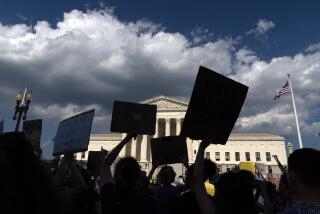Report Says ‘Abstinence-Only’ Programs Met With Resistance
- Share via
WASHINGTON — Programs that encourage teenagers to abstain from sex have multiplied in the last five years, but they have had trouble engaging parents and local schools, according to a national evaluation released Tuesday.
The “abstinence-only” initiative, to which Congress directed nearly $500 million as part of a massive 1996 welfare law, is controversial because it bars any discussion of condoms or birth control, other than to explain their limitations.
Tuesday’s report, written by independent researchers who are evaluating the initiative, reaffirms that despite claims by advocates, there is no reliable evidence that these programs are effective in reducing teen sex, pregnancy or the transmission of disease.
Congress is debating whether to renew the funding for another five years, as President Bush has requested, or allow the money to be spent on a broader range of activities.
Given the restrictions, states across the country debated whether to take the money. Eventually every state took it, though one, California, dropped out.
“The funding has stimulated considerable discussion at the state and local level on the problem of teen sexuality,” the report said.
In 1999, about half of high school students and nearly two-thirds of graduating seniors reported having had sex. That is a small drop from earlier years, but the report says there is no evidence to link the decline to abstinence-only programs.
More to Read
Sign up for Essential California
The most important California stories and recommendations in your inbox every morning.
You may occasionally receive promotional content from the Los Angeles Times.










